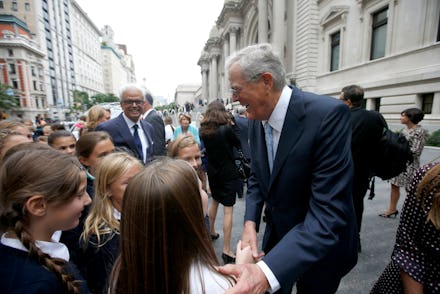The Koch Brothers' Shadow Primary Proves Who's Really Calling the Shots in 2016

When a New York Times reporter tweeted Monday that the "'Koch primary' is over, and Scott Walker won," the world of presidential politics froze on its axis. The billionaire Koch brothers had, according to a donor at a fundraiser cited by the New York Times, formally cast their considerable lot with likely Republican presidential candidate Gov. Scott Walker of Wisconsin.
"We will support whoever the candidate is," David Koch reportedly told his audience, "but it should be Scott Walker." A spokesman later disputed the quote, which has since been removed from the story and replaced with a softer endorsement. Still, 13 words from one man, seven months before a vote would be cast, had flipped the race on its head.
Why it matters: Why do we care so much what a pair of sensationally rich brothers think about the GOP primary race? There are, after all, no shortage of deep-pocketed donors, and not just Republicans, happy to spend millions — and fundraise even more — to bankroll presidential contenders.
What distinguishes the Kochs, however, is their unique combination of cause and cash: owners of one of the world's largest private corporations, Koch Industries, they are no well-heeled fanboys clamoring for an audience with a pop star politician. They want their money's worth; they want influence. They want, it has become increasingly clear, to decide who will win the 2016 Republican presidential nomination. By promising in January to spend nearly $900 million this election cycle, more than double their 2012 tab, and some of it during the primaries, they dug their claws even deeper into the contest.
So it follows that the Kochs would be in an uproar to erase their initial comments from the public record. In a statement provided to the New York Times later Monday, David Koch sought to be more "clear" about his remarks, saying, "I am not endorsing or supporting any candidate for president at this point in time." No sense in shutting down the game before it really begins. By Tuesday morning, Politico had by some coincidence come upon the information that the Kochs were not completely in the bag for Walker.
"A top Koch aide revealed to [Politico's] Playbook that Jeb Bush will be given a chance to audition for the brothers' support," White House correspondent Mike Allen wrote in his morning newsletter. All this, "despite initial skepticism about him at the top of the Kochs' growing political behemoth."
"We wouldn't want to take options off the table by getting behind one of them now," the aide told Politico.
Keep them working: What exactly did this aide mean in discussing "options"? In context, it was clearly meant as another word for "candidates" — why squeeze anyone with any juice out of the opportunity to genuflect before the Kochs? But there is an alternative, even less charitable reading, and it goes like this: Those treasured "options" are not candidates but the favors and influence those candidates are willing to promise the Kochs in return for their backing.
Whatever surrogates tell Politico, Walker remains the Koch brothers' favorite son. David even told the New York Times the family might be willing to pull from their personal coffers to give his campaign a lift. For now, the big prize would appear, as desired, to remain for the taking. Sen. Rand Paul (R-Ky.), among the potential suitors, composed a brief love letter to the brothers in Time magazine's 100 Most Influential People list. "Ideas men" was the title.
But Paul, like the other contenders, will need to do a lot more than scribble a few praise paragraphs to win the keys to Koch brothers' kitty. In 1979, Bob Dylan sang, "You're gonna have to serve somebody." If the Kochs continue to have their way — and with federal election finance law in shambles and likely to stay that way — that somebody is going to be them.